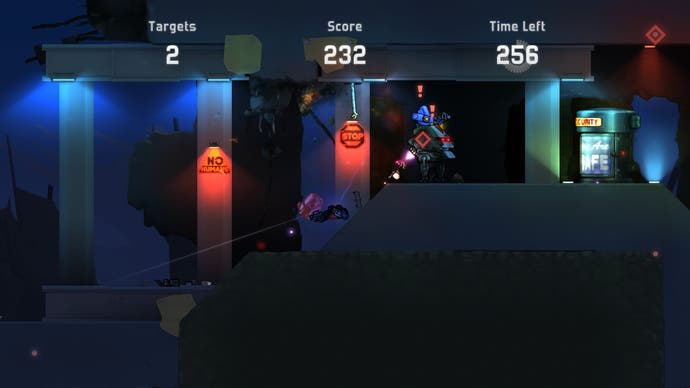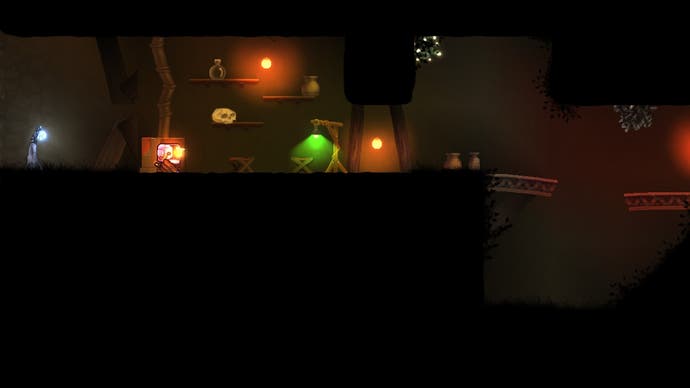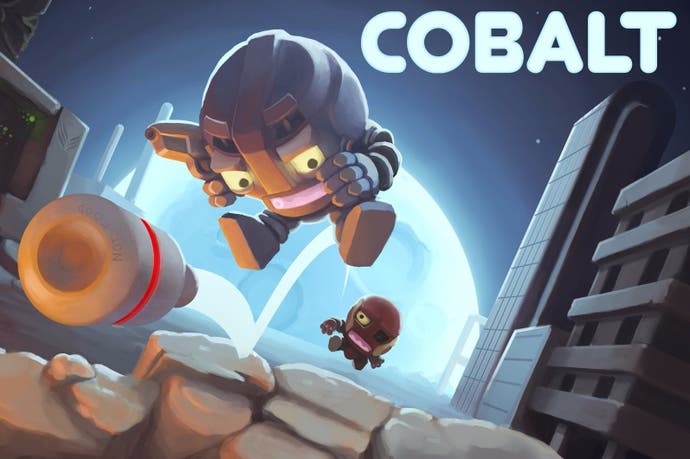Cobalt review
Smelts like teen spirit.
At first, Cobalt feels wonderfully rambling and wayward, a game that has clearly relaxed into a lengthy development and then decided to just spread out a little. I get the impression its developers have followed whims, and so: campaign, multiplayer modes, challenges. Guns, throwables, melee. Pets, lockpicking, hacking games, loot, stealth, active-reloads, co-op, block-mining, in-game conversations, unlocks, boomerangs, flashbangs, memes, level editing, dancing.
I have left stuff out. I have left crucial stuff out. I have left out the fact that your feet glow when you hit top speed. I have left out that time my head turned into a propellor and I could suddenly fly. And yet at the heart of it all is something deliriously simple that provides just enough focus to tie it all together. Across all modes, across all entertaining distractions, Cobalt is the 2D platform-shooter-brawler in which you can combat-roll into oncoming projectiles, trigger a glorious moment of auto-slo-mo, and knock whatever's headed your way back in the direction it came from. It's relatively hard to pull off, but that's the point. In your early hours of the game you'll find that you can also pull it off through sheer luck every now and then. That's also the point.

If I've made it sound something like Vanquish, be warned: for your first few hours, it is definitely nothing at all like Vanquish. Cobalt offers its waddling robot protagonist a precision move-set of rolls, double-jumps, punch-jumps and slides alongside melee, ranged and thrown attacks, but it mounts all this stuff in what looks rather convincingly like chaos. Knockabout physics-heavy environments. Encounters that earn their particular character through their strangely brilliant lack of rhythm - lulls followed by enemy spamming, bottlenecks that can be intractable one minute and cleared in seconds on the next attempt. Even the challenges, which for the Cobalt newbie like myself are probably the best place, rather paradoxically, to get the measure of things, are too hectic to bow before sheer precision. There is generally a way to ace each downhill-chase or blow-up-three-of-X, but the real fun comes from uncovering all the ways of completing these treats that are probably unique to you alone, and unique to the way that you have fumbled one section and absolutely S-ranked the next.
Over time, however, a different game starts to emerge: a game that actually wants to have it both ways. Beneath the chaos, there is plenty of scope for mastery here. Take campaign mode. Combat rolling, which can deflect shots, seems overpowered until you realise it's actually a precision tool - it changes where your own shots end up. The more you play, the more you notice this kind of thing, and the more that precision starts to outweigh the madness. Yes, this is a campaign in which a panther-type thing might jump on you out of the blue and kill you stone dead in the middle of a great run, but it's also a campaign in which you could have dealt with that panther-thing if you were fast enough, and where the perfectly sighted headshot from across the screen, while moving, gives a thrill that no accidental victory could ever provide.
Similarly, movement can seem too hectic to make sense in early levels, but it's actually a dance of momentum, allowing the more skilled to access higher spots on the map, and move across empty space that much quicker. The motley arsenal you uncover all has its specific uses, from flashbangs to wrenches, to the screen-clearing thermal bomb. Sure, enemies that explode with randomised announcements of Super Rare Loot that can change the course of the next five minutes, and sure, the wildlife and the baddies you encounter are often happier fighting each other than they are turning on you, but Cobalt is still a game that will treat you right if you pay attention to it. You can get better at, and the better you get at it, the better the game becomes in return.

The same holds for the other modes, whether it's the endless dash to the best weapon that defines the first few seconds of a deathmatch (but never defines the course of the match overall), to the bots that can be gamed in team deathmatch, or the shifting pace of a round of Plug Slam, Cobalt's version of Capture the Flag. All of these treats play out across snug maps riddled with devious routes you probably won't notice on your first visit until it's too late, and then there's the Horde-like survival mode, and those brilliant challenges, hare-brained tests of speed and aggression. Just one of these, Predator Checkpoint, has eaten up an hour and a half so far as I sneak - for the most part - through a darkened enemy camp, taking out deadly targets, at least one of which has decided to wait for me in a mech.
I love the unexplained mechs, and the endless push and pull between chaos and order. I love that Cobalt often doesn't explain itself. That active reload system is not mentioned in the tutorial, for example, while loot and upgrades and throwable/ridable pets are all systems you have to prod your way through in order to make sense of them. The result is a game that you'll never truly feel you have fully got to grips with, perhaps, but it's also a game that will be able to surprise you time after time.












